Q&A: Pac-12 Networks' Nick Aliotti on Chip Kelly, tempo and his innovative offenses
When Mike Bellotti interviewed potential offensive coordinators at Oregon in 2007, he sought input from his defensive coaching staff.
To gain the perspectives from the opposite side of the ball, Bellotti had them meet with the candidates.
That gave Nick Aliotti, the Ducks’ longtime defensive coordinator, his first look at a bright assistant coach from New Hampshire named Chip Kelly.
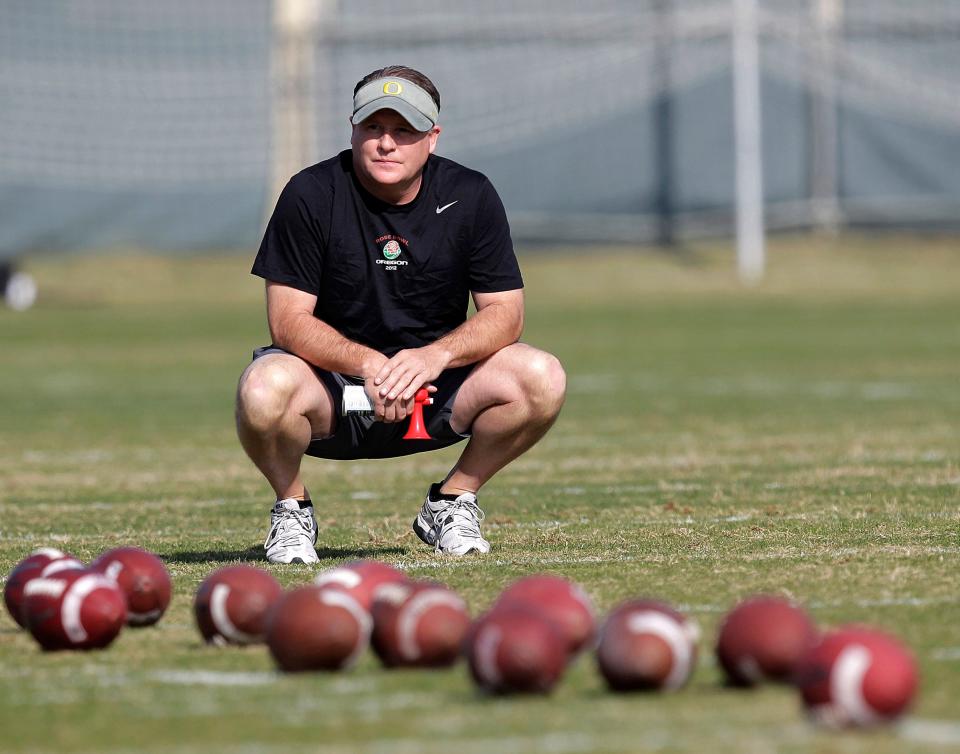
The two of them would spend the next six seasons together, the first two of them as coordinators before Kelly was promoted to replace Bellotti.
Aliotti has since kept a close eye on Kelly. An analyst with the Pac-12 Networks since his retirement in 2013, he watched Kelly lead UCLA for the past six seasons and was struck by his move to Ohio State this month, leaving a head coaching job to become the Buckeyes’ offensive coordinator.
“You don’t see that happening too much in this football world,” Aliotti said.
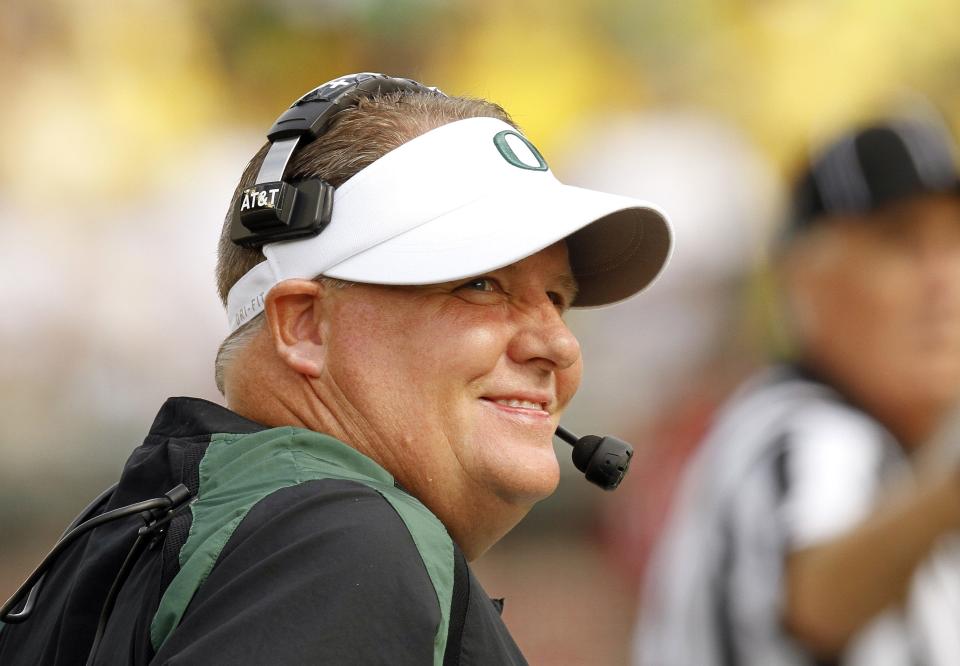
In an interview with The Dispatch, which has been edited lightly for length and clarity, Aliotti discussed Kelly, including his no-huddle spread offense that revolutionized the sport, the experience of defending it in practices and his evolution as a play-caller.
“Ohio State is in for some good years ahead with Chip as their offensive coordinator,” Aliotti said.
Q: When Chip first came to Oregon, what were your impressions of what he was doing on offense?
A: The first thing I remember is when Chip interviewed so to speak, we were very impressed by his knowledge of the quarterback zone-read plays and spread offense and whole nine yards. Chip left after the first interview and dinners and a couple beers and stuff and was not going to take the job, and we were so impressed that a bunch of us were calling him and saying you need to come here and you need to try this. He came from New Hampshire, and I’m sure he thought that was going to be a big step, but the guy's just an incredible offensive mind.
Q: What really impressed you in the interview?
A: Coach Bellotti at the time was looking for more of a spread, a more modern attack. Chip just really knew that offense inside and out. Plus, the tempo thing was something he was going to bring. I’ll be honest, as a defensive coordinator, I wasn’t all that excited about the tempo, but as we got going with it, in reality, it made me a better coach and us a better defense.
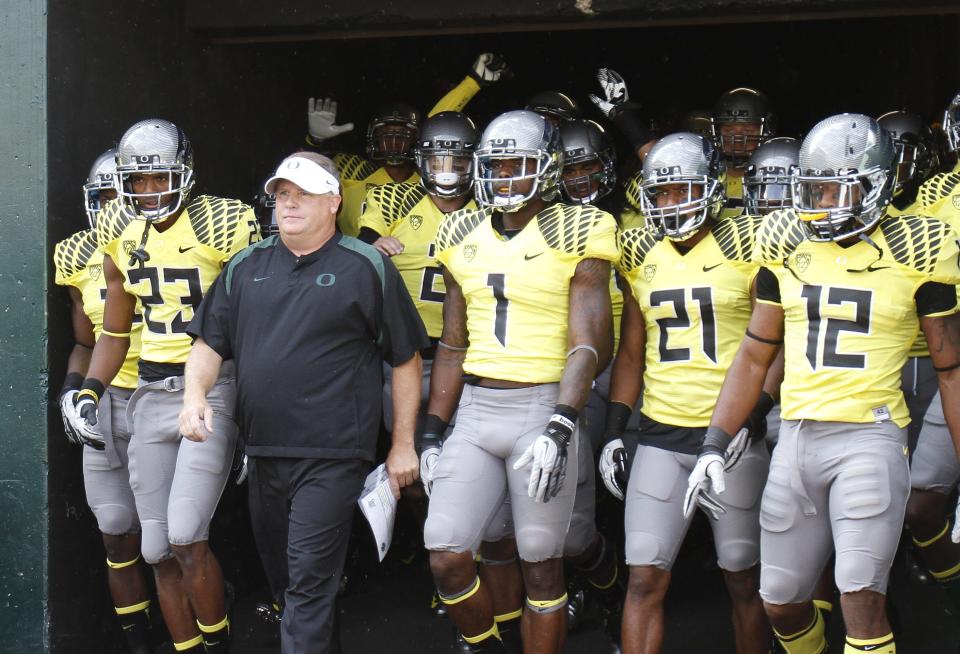
Q: I imagine it made practices tougher.
A: At first, I hated it, I didn’t like it, but it really helped us. I can't even explain to you how fast our tempo was. A lot of people talked about tempo. The way we did it in practice, it was like hyperspeed. Maybe there's a few teams out there to duplicate it. But in practice, it was so fast. We were barely getting back to the line of scrimmage, when the next play was being snapped, and I know that was on purpose. It taught me and taught us how to play like a hockey team, where we change lines, where we have maybe two linebackers and a lineman go in after every three snaps, or a secondary guy and a lineman and linebacker go in. What that did is kept guys fresh. So the tempo didn't get to us, number one. And number two, a lot of times, your first team would get all the reps, but now you're getting first and second teamers equal reps. If you lost a guy, or the next year came about, your second team was already prepared. It really did two things for us.
Q: People have always described his offenses as innovative. That has been the word so often used. Was the innovation the tempo or other stuff?
A: I wasn't in the offense huddles, but I saw it every day, I think it was the tempo, the way Chip did it and the way we practiced. And Chip is a bright, bright offensive mind. He can do a bunch of things with a bunch of groups and a bunch of ways and has enough tricks in his offense that keep you off guard. He's just really good at creating an offense that can attack a defense. He's very creative. He’s one of one of the brightest offensive minds I've ever been around
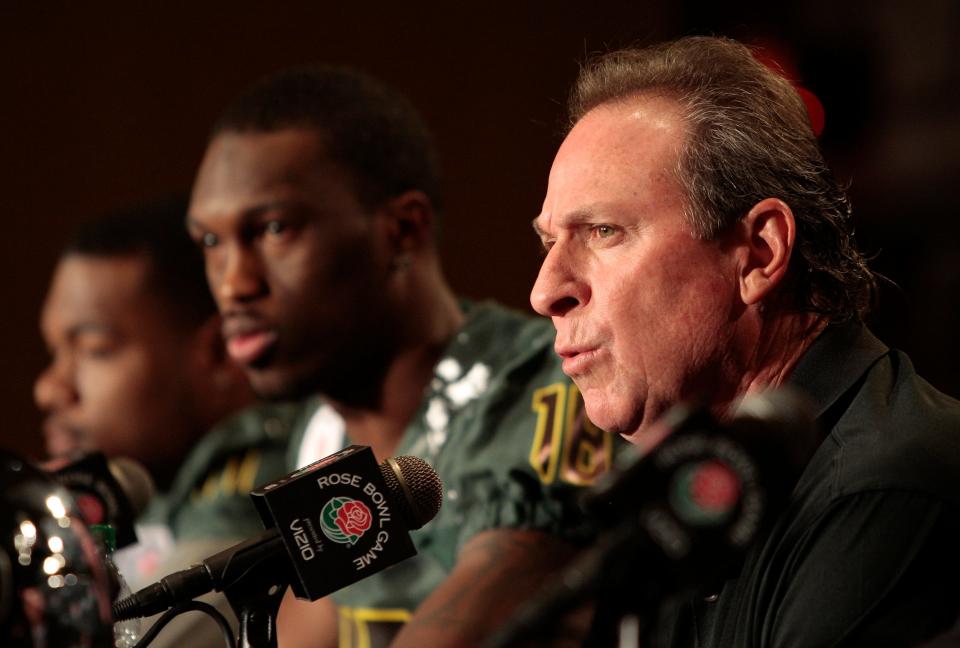
Q: How many teams in the Pac-10 or Pac-12 were going at that speed?
A: Maybe a few. But not even close to how we did it. Not even close. I remember when I visited Nick Saban (at Alabama). He brought me there to talk about tempo and defending tempo when I retired, and they tried to practice that very day I was there and he came over and said, ‘What do you think?’ I said, “Well, that’s a good start.’ It wasn’t even close. I didn’t have the heart to tell him to go a lot faster than that.
More: Join the Ohio State Sports Insider text group with Bill Rabinowitz, Joey Kaufman Adam Jardy
Q: How did the tempo create hockey lines?
A: It'd be two or three huddles going at us, and sometimes we practiced where two or three offensive huddles would go against one defense. We call it strain for 11 straight plays, and I'm telling you, that takes a lot out of you as a defense. You had to play those 11 straight plays on defense. And then we do the same thing on offense, where we'd run three defensive huddles against one offense for 11 straight plays. Tempo doesn’t seem to be as big a deal anymore. It’s still utilized from time to time. But not like it was back then and what Chip did with it.
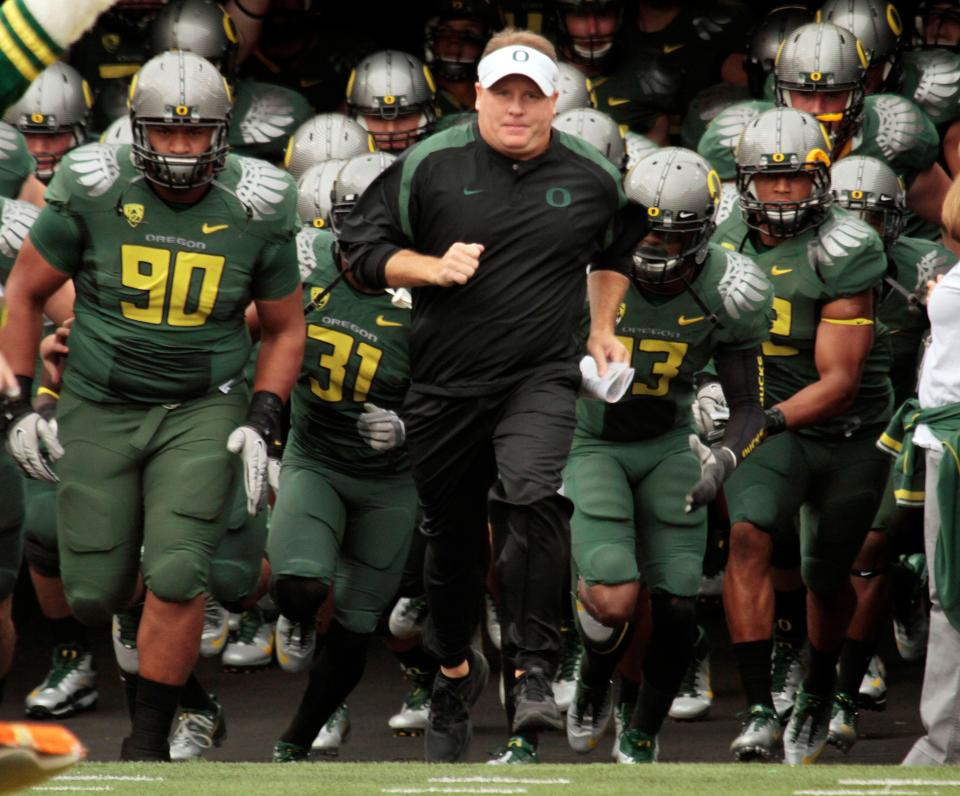
Q: Does Chip not use tempo as much? How did his offense evolve from Oregon to UCLA?
A: I didn't see him use it as much. It wasn't nearly as fast. He's changed a little bit. If he wants to, he could still gear that stuff up, but he didn't do it as much at UCLA. Certainly not at the level we were doing it. Chip runs a spread offense. But it's predicated on running the ball first of all. A lot of his offenses, particularly when we were in Oregon, we led the conference in rushing, for like nine or 10 straight years, at about 200 yards or more a game. Even though he's spread, he wants to run that ball first. He knows how to run the ball very well.
(Editor’s note: In each of Kelly’s four seasons as Oregon’s head coach, the Ducks were atop the Pac-10 or Pac-12 in rushing, including averaging as may as 315 rushing yards per game in 2012.)
Q: That seems to be a common denominator. Everywhere he’s been, they run the ball well. Why do you think his offenses have always been effective in that area?
A: I don't know if I have the answer to that. Good players help. But also if you tire a team down. We always used to think that the second half, particularly the fourth quarter, was going to be ours, because we just keep coming at you and coming at you at full speed. At the end of the game, you're pretty much worn out. You're going to give in, or you're not going to give in. A lot of times, no disrespect to anybody, we just wore you down.
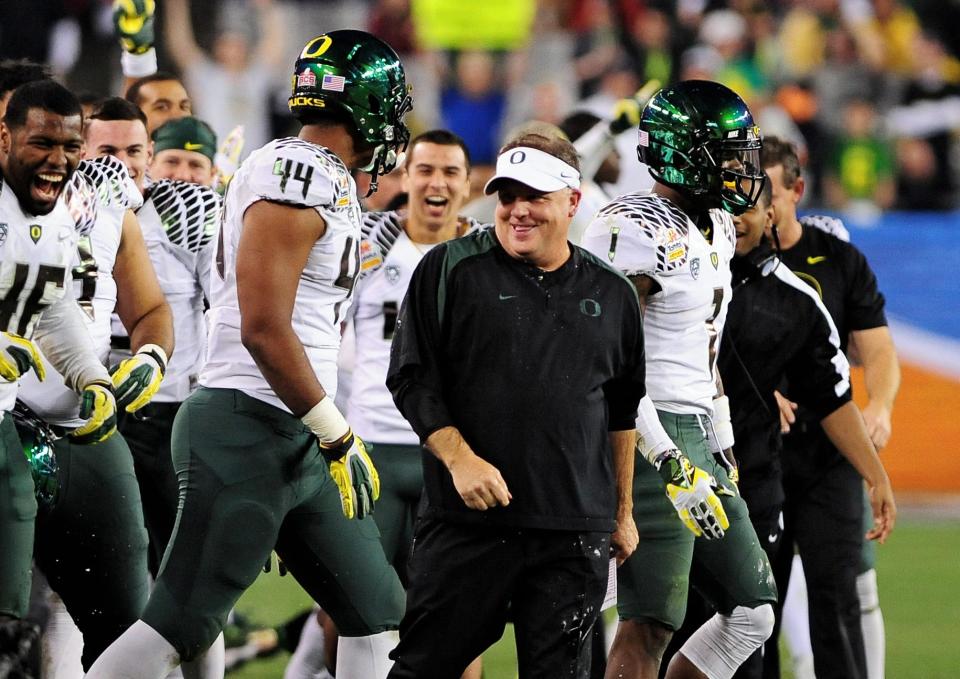
Q: Just because of the number of plays that were run?
A: We would run probably 90 plays or more a game. That's a lot of snaps. I have no idea what Chip's going to do at Ohio State. I'm sure between him and Coach (Ryan) Day, they'll have something up their sleeve, but I know this, with the players Ohio State gets, particularly if they have a quarterback, that offense is going to be hard to stop.
Q: When they were spreading it out at Oregon and running out of those situations, what was it like in practice? How difficult was it to stop?
A: He has a lot of innovative ways of blocking with those quarterback runs and inside zone and outside zone and all that stuff. But I will say this, and maybe Chip was lying to us, but he said the hardest defense he ever went against was ours on a day-to-day basis, because we saw it so much. Obviously, we had an advantage. We never were the underdog. I'm not saying we didn't lose some days, and they didn't win some days, but unless he was just pulling my leg, he said we were the toughest defense to go against, because we saw it all the time and we got used to it.
Q: You guys were probably more accustomed to rotating.
A: I'm not going to say for sure, but I think we were the first to start playing like that, because we wanted our guys to be fresh. And I’m not kidding. Every practice was so fast, you couldn't coach during practice, you had to rely on the film. And every three or four plays, guys were flying in and out of the huddle, running plays and it made us better because we got we built it the two deep (depth chart) that way.
Q: Why do you think he ran less tempo at UCLA?
A: I really can't answer that question. I wish that I could. All I know is I watch college football, and some teams are really good at it, but I see less and less tempo than I used to. I see parts of it being integrated in the game for some teams. But we were pretty much tempo the whole game. It didn't matter if we were ahead or behind. We're still tempo. We were smart enough in the last four minutes to run out the clock and take our time, those kinds of things, but we were going to run tempo all the way up until we could feel the game was taken and we could let the clock run down. The foot was always on the gas pedal.
Q: How much has he varied his stuff and been creative?
A: I think he has a good knack for calling plays, and seeing what's going on in game and changing things. He's just a good football coach.
Joey Kaufman covers Ohio State football for The Columbus Dispatch and can be reached at jkaufman@dispatch.com.
Get more Ohio State football news by listening to our podcasts
This article originally appeared on The Columbus Dispatch: Q&A with Nick Aliotti on Ohio State offensive coordinator Chip Kelly
